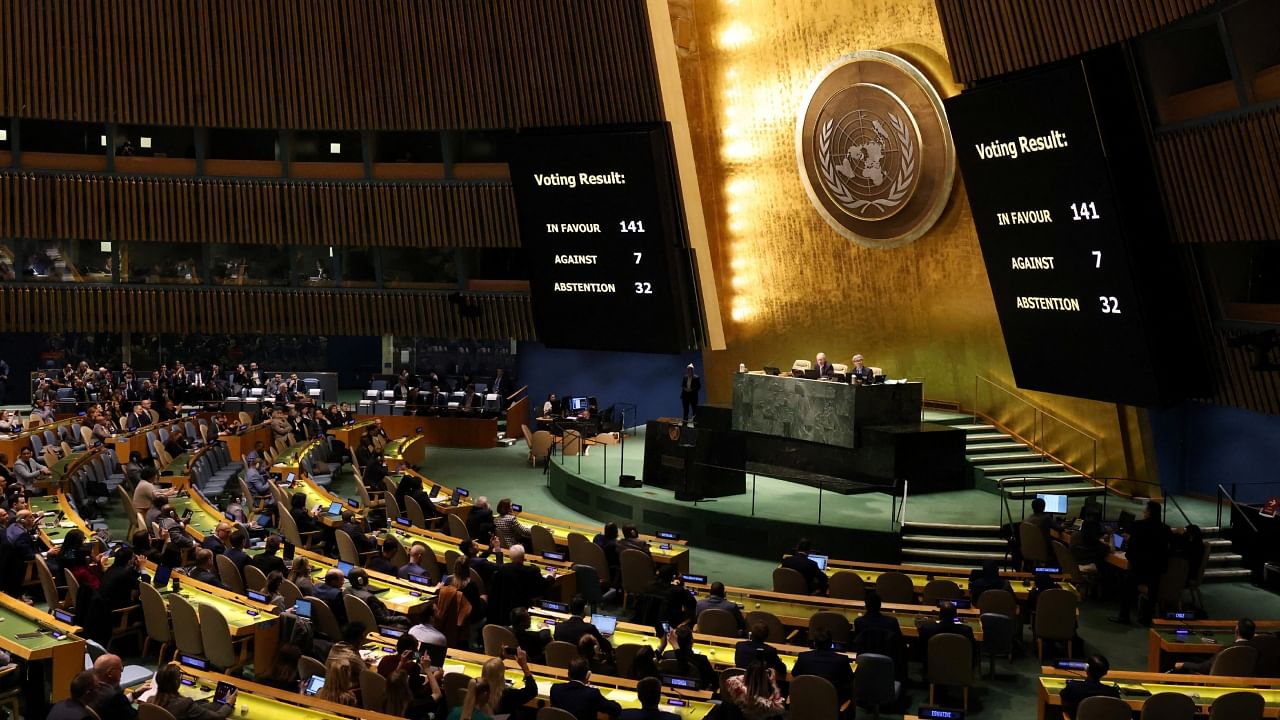
The United Nations voted overwhelmingly Thursday to demand Russia immediately and unconditionally withdraw its troops from Ukraine, marking the one-year anniversary of the war with a call for a "just and lasting" peace.
Ukraine earned strong backing in a non-binding vote that saw 141 of the 193 UN members in support, seven opposed and 32, including China and India abstaining.
Coming on the eve of the first anniversary of the brutal war, support for Kyiv was little-changed from that of last October when 143 countries voted to condemn Russia's declared annexation of four Ukraine regions.
The vote came after two days of debate during which Kyiv urged the international community to choose "between good and evil."
The resolution reaffirmed support for Ukraine's "sovereignty" and "territorial integrity," rejecting any Russian claims to the parts of the country it occupies.
It also demanded "that the Russian Federation immediately, completely and unconditionally withdraw all of its military forces from the territory of Ukraine within its internationally recognized borders," and called "for a cessation of hostilities."
The vote showed Moscow's continued isolation on the world stage after 12 months of war.
Despite its support from only a handful of countries, Russia has used its veto power to block any binding motions against it in the UN Security Council.
Instead, the UN General Assembly has taken up the issue, displaying solid support for Kyiv in successive votes.
"Next year, we should not meet here to mark the second anniversary of this senseless war of aggression," said Japanese Foreign Minister Yoshimasa Hayashi during the debate.
"Russia can and must stop, tomorrow," French Foreign Minister Catherine Colonna said.
"This war waged by Russia is everybody's business because it threatens the existence of a state, because it represents a domineering and imperialist plan, and because it denies the existence of borders."
But Russia dismissed the resolution, with its UN representative Vasily Nebenzya calling Ukraine "neo-Nazi" and accusing the West of sacrificing the country and the developing world in their desire to beat Russia.
"They are ready to plunge the entire world into the abyss of war" to maintain their own "hegemony," Nebenzya said.
European Union foreign policy chief Josep Borrell rejected that.
"I want to stress it: this war is not a 'European issue'. Nor is it about 'the West versus Russia'," Borrell told the General Assembly.
"No, this illegal war concerns everyone: the North, the South, the East and the West."
The vote showed India and China had not been swayed to outright condemn Moscow's invasion, even while both have criticized Moscow's threats to deploy nuclear weapons in the conflict.
Before the vote Dai Bing, China's deputy representative at the United Nations, took a neutral stance, calling on both sides to cease fighting and enter peace talks.
"We support Russia and Ukraine moving towards each other, resuming direct dialogue as soon as possible, bringing their legitimate concerns into the negotiation, setting out feasible options, putting an early end to the crisis and giving peace a chance," he said.
But he also gave voice to one of Russia's justifications for the invasion, that its own security was under threat by Ukraine's tilt toward Western Europe and NATO.
Any settlement, he said, should give "due regard to ... the reasonable security concerns of all countries, thereby properly addressing their legitimate security aspirations."